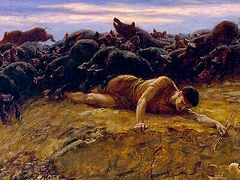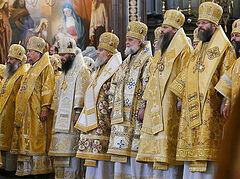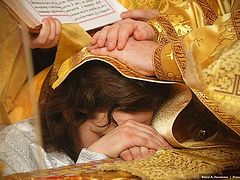Part 1: Christian Exorcism and Holiness
Part 2: Baptism, and Eight Steps to Casting Out Our Own Demons
Part 3: Possession vs. Psychiatry
 Photo: bogdan-63.livejournal.com
Photo: bogdan-63.livejournal.com
But you are a chosen generation, a royal priesthood, a holy nation, His own special people (1 Pet. 2:9).
Pay attention to how he addresses the readers of his epistle. Whatever you call someone, this is what he will be. If you say a hundred times, “You are a pig”, he will end up grunting. “You are a chosen generation, a royal priesthood, a holy nation.” In other words, all of you are taken out of the world, no longer destined for this world. “His own special people.” What word do we use to describe it? Laity. He for example is a clergyman. But we are laity. Right. I am a clergyman for the time being. I once had the “privilege” of visiting a convent. So, what do you think I heard? “Oops, but he is of the world.” [“White clergy”—a married priest–Ed.] Yes, and I guess I thought that those not of the world were hiding behind the iconostasis. It turns out those behind it are of the world, too. Not of the world are only those who are behind the monastery walls. Lofty monastics, they are not of the world. But this “priestling” is of the world.
We move this boundary in so many ways. We have among the audience those who already have performed baptisms. When we perform the Baptism and Chrismation, we dip the sponge in water and what do we say? “Baptized, illuminated, sanctified.” You were sanctified! An already accomplished fact. You are a saint. That’s it, your life in the world is over. You are taken from the world. You no longer belong to this world. This is what should pierce our consciousness, both of the priest’s and the ones we baptize. Then, of course, we have a certain hierarchy.
Yes, we all emerged as saints from Baptism. And then there is another level. We step behind the iconostasis and become a part of priesthood. Next, yet another level. We pass the monastery gates and become monks. It’s not the limit yet. We leave the monastery to become hermits. For a hermit, I suppose the monks residing in a monastic community are of the world. Be perfect, as your Father is perfect. Let the one who is holy continue to be holy, the Book of Revelation says. What we ironically specified at first, does happen. But we should understand that the first level is the major one, and everything else is of secondary significance. Even at our subconscious level.
So, who is the priest here? You? Who are you in the first place, a priest or a Christian? A Christian!
We are witnesses to the tremendous devaluation of the concept of a Christian. It’s as if being a Christian means nothing at all
The formulation of the question dictated the answer. So, here I am, a priest. What if I’m also an archpriest... This is very important; regardless of the degree of ministry—be it a bishop, a patriarch, or a priest—first of all, I am a Christian. My position is about the ministry to God. What we are witnessing is a complete or, rather, a tremendous devaluation of the concept of a Christian. It is as if being a Christian means nothing at all. Being a Christian does not mean you should attend church. It doesn’t mean you shouldn’t swear. It doesn’t mean you can’t get a divorce. It doesn’t mean you have to pray. It doesn’t mean anything. It only means that you were baptized.
And who is creating this situation? Firstly, we [the priests] are. The faithful are responsible, too, but they assume it in their innocence. As for us, we were taught in the seminaries.
That’s why it should be imbedded in our consciousness, and we must drill it into our catechumens. And maybe talk in less detail about the Trinity: One in Essence, Undivided, Inseparable, and so on? Even some of our academy graduates, or even some illustrious theologians, cannot fully grasp it. Because God is incomprehensible. We should talk about the simple matters instead. If you have holy water—that’s it, you can’t cook borscht with it. Neither can you mop the floors using it. You were made holy—that’s it, you are no longer intended for earthly use. You are people taken as an inheritance. You are holy people, made separate from this world.
A follow-up question, what does the word “laity” mean? “Friendship with the world is enmity with God” (cf. James 4:4).
Love not the world, neither the things that are in the world (1 John 2:15). So, what are those laymen? Who are they? God’s enemies? Well, it says, “friendship with the world is enmity with God” (cf. James 4:4). And it’s not that friendship with the world, but the world that is made of the laity. You see how these things unfold. Certainly, it is of great importance to our pastoral ministry.
A Greek word—the people. If we say that we are of the people, what do we mean? Who am I? What should I call myself? A representative of the people? A populist? There is no such thing in Russian. But there is one in Greek. The world, whose friendship is enmity with God, is “cosmos”. That is, the world is cosmos. On the one hand, it is a very good word, as God’s creation. On the other hand, it is exactly what makes you an enemy of God if you are friends with the world.
Now, let’s look at this word in Old Slavonic. “Мiръ,” “мирянинъ” (tr. translated as “world” and “laity” into English). In Greek, there is kleros and λαϊκός. Clergy and laity. A cleric is an attached priest, an acolyte, the parish clergy. It means that clergy is everyone, beginning from the reader and the sacristan to the bishop and the patriarch. In this sense, all of us are clergy: we are assigned to serve our Lord. This is kleros. And the λαϊκός are the people. That is, kleros and λαϊκός—it sounds very good in Greek, meaning the ministers and the people. It would have been good if we [Russians—Ed.] also used the “ministers and the people,” it would have sounded different. Instead, we’ve got these confusing terms in Russian. Because we pray for peace in the world and, apparently, in the Old Slavonic, the word “peace“ was the same as λαϊκός. Otherwise, there is no justification for the Russian word “мирянин,” or layman. In order to find in it any justification, after all, we have to understand the world as God’s people.
So, there are ministers among God’s people. It’s clear since it is a universal term. It is the same in every affair. In the military for example there are officers and soldiers. It is the same at church—there are the people and the ministers, instead of this strange separation into clergy and laity. [“Laity” in Russian means “of the world.” English follows the Greek, as “laity” is from Gk. laos = “people”—Ed.] As if the former should lead the spiritual life while others should only have the secular. It simply doesn’t make any sense. Because, first of all, we have agreed that we are first and foremost Christians. And only then am I also a priest. In the first place, I am a part of the people taken as an inheritance. Made holy and taken from this world. That’s what we have to instill in our people.
Paste-on Piety
Do you know where it is most pronounced? Let’s enter a typical parish church. You go inside. There are tiny changing rooms on the right or on the left. They’ve got hanging rods holding what
—Scarves.
Scarves and skirts.1 So, you can be anything you want outside. But inside the church, you have an Orthodox outfit, as one priest’s wife put it—that is, you have suddenly become Orthodox. Once the service is over, you hang it all back on the hook and off you go, back into the world wearing your torn jeans or a miniskirt. It’s simply appalling and such a disgrace! Would you enter your boss’s office dressed in tatters? But here we enter the office of our God! Precisely because we think there’s “that” world, where we’re laity, while here it is a different world, a special one. I’m simply Eddy outside, but here I’m John; they even gave me a different name. I’m Rose outside, but here I’m Leah. Even my clothes change. Nothing but a double standard. By the way, our priests are just the same. Somewhere over there, next to the sacristy, they’ve got beautiful hangers, and cassocks. Then wham, he’s wearing a smart jacket and jeans—and off he goes, rushing back to town. Back to church, and he’s back into his cassock, and all the right stuff. We are lucky they haven’t yet invented stick-on beards.
You know, a young man once served with us. He was from a faraway place, deep in the taiga, and had spent ten years at an Old Believer monastery. Imagine, an Old Believer, not some ordinary guy; he stayed in an Old Believer monastery for ten years. Sure, he had heard stories about us, the Nikonites. So, he arrived to serve with us, and he was accepted in our church. What can I say, a very nice man. I think he liked us a little bit, too. So, he stays with us and then confesses, “I was around you for three days, observing and watching. Especially that habit of yours, when you’d suddenly take out a tiny comb and quickly brush your beard.” He truly believed the stories that our beards were fake, like, glued on. So, he finally realized they weren’t glued on.
We shouldn’t glue on piety. Everything should be of the essence. For example, during Soviet times, a priest would be walking in town wearing his cassock. An old lady, one with big hair and loud makeup, notices him. Sorry—she isn’t a lady but a comrade, as they were known at the time. She derides him angrily, “Why are you dressed like that?” “Because I’m a priest.” “Well, so what? I’m an actress. I have played in all sorts of plays on stage. But I change after every performance.” The priest replies, “That’s the whole point. You were playing your roles, while I am a priest for life. Had I been playing the role of a priest at church, I would have changed my attire once I was done serving.”
Besides, people experience a split consciousness. Our women for example, who often wear some truly odd pieces of clothing, have to wrap even more odd-looking things around their waists called skirts. I feel obliged to tell them, “Well, next time, simply put on a dress, or a normal kind of a skirt. How would you dress if you were going to see your boss? Dress the same, then, for God. When you are invited to someone’s house, what type of clothing do you wear?” “My good clothes.” “But here you have come to God’s house.” And you know, they do get it. They’re finicky, fussy about the clothes they wear, our women. That’s when they start to feel something. But sometimes they don’t feel anything. That’s how we live, with this double standard. Unfortunately, the priests do, too. This is life with a double standard, when it differs here and there.
Of course, it’s different if you’re working in the garden, shoveling snow off the roof, or doing other things like that. Of course, you choose to wear—and it’s always been like that—some work-appropriate clothes. So we shouldn’t become crazy fanatics over such things, or be a Pharisee, as we call it. If you are a priest, be one. It’s not like you’re playing the role of a priest.
The word “holy,” of course, also means “filled with the Holy Spirit”. It happens again during Baptism. The Apostle Paul tells the Corinthians what we should also tell our flock: Or do you not know that your body is the temple of the Holy Spirit who is in you (1 Corinthians 6:19). In this respect, holy water is not just what we take from a tank, a couple of liters, and that’s all. No, we say a prayer, “filled with angelic strength”, and there is the Holy Spirit. So, we believe it is not a matter of physical or physicochemical changes. By its physicochemical qualities, water will always remain just water. It is the Holy Spirit that fills everything. A Christian is the temple of the Holy Spirit. Ask anyone, “Would you allow yourself to speak or act in such a way inside church?” No. But the church is you.
Actually, when did these churches appear? The very first one was built at the end of the third century. But the building of churches basically started in the fourth century, with Constantine and Helen. We are the temple of God. Your bodies are in essence the temple of the Spirit Who abides in you. What are relics? I mean holy relics. Relics, you know, are bodies. What happens at death? Here, we have some—especially the liberal-minded—and a few others, who condemn us for corpse worship. When a person dies, the soul departs and a corpse remains. We pray: “Give rest O Lord to the soul of Thy departed servant.” In general, we stop praying for the body. Or we have in the funeral rites, in which we chant, “I weep and with tears lament when I see there sleeping the beauty that was once fashioned in the image of God but now is shapeless, ignoble, and devoid of all comeliness.” And that is it. The soul has left the body, but what about the Holy Spirit?
It was quite obvious in Soviet times. The absolute majority of churches were lying in ruins. So, these ruins—are they holy places or not? I remember, I walked through some of those ruins, the truly grand ones. I remember how I loved those ruins. We always treated them as holy places. So when the times changed, these ruins were returned to us and we made them into churches again. But, other than that, we could often find a better location, or it would have been easier to build a new church than to rebuild from the ruins. But it is a holy place. Relics are like those ruins. The soul has departed, but the Holy Spirit remains. That’s why there are holy relics. The Holy Spirit stayed. These are holy relics.
A Christian should be told that he must treat himself as a temple. You don’t own yourself any longer. You have no right to say, “These fingernails are mine”. You are the temple of God. It is the same with a newly built church—it’s just a building, but as soon as it’s consecrated by a bishop it becomes a House of God. You were baptized, so these cute little fingernails of yours are God’s, too. Take a look, sweetie, at your nails, are they God’s or what? Aren’t you ashamed before God? Because you know what they can look like these days. So yes, it all matters as well. We are a temple of the Spirit Who abides in us. It is the sense of holiness. And the soul is in there, too, for now. That is, the body is both the temple of the soul and the temple of the Holy Spirit. Therefore, our soul abides in the Holy Spirit. That’s why we are called to pray in the Holy Spirit—because our soul abides in the Holy Spirit. But when we lay a dead man to rest, no one summons his body to prayer, because the soul prays up there, at the Throne. I am talking about the God-pleasing saints.
Not all are righteous, but everyone is a saint. Everyone is a citizen, but not everyone is a hero. That’s what a righteous man is—a hero of the Church
Well, and one last thing. What about those whom we call the saints? Why did only one raise his hand, but let me guess: everyone present is a saint. “Thou art sanctified”—these words were spoken for each and every one of us. Because we always think of a saint as being something else—a righteous man. In the Biblical language, not everyone is righteous, but everyone is a saint. Everyone is a citizen, but not everyone is a hero. As for the righteous man, he is a hero of the Church, an ascetic and a God-pleasing saint. So, of course, to raise your hand and say that you are a righteous man—well, you have to be crazy! No one can call himself a righteous man. And during that confession, for that matter, the priest I mentioned earlier should have asked: So what are you, a righteous person?
Therefore, the righteous are a special kind of people we hold in reverence. But the saints of God are the ones who belong to Him and are no longer meant for the world; that is, all of us. And so, if all these specific details get settled in our mind, they will find reflection in our day-to-day life. As a result, you will see certain changes in your parish in a matter of a few years. That is, it will begin to take shape. That’s the way it is.




